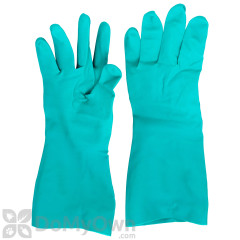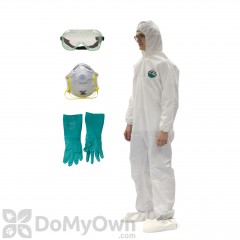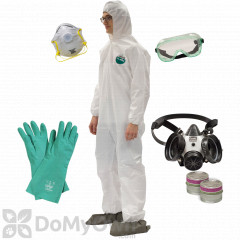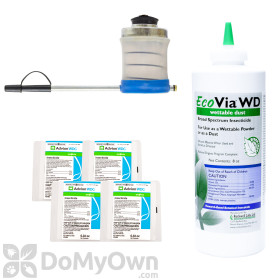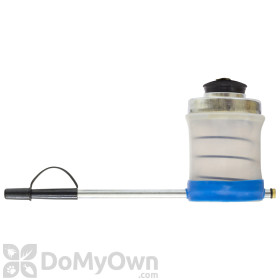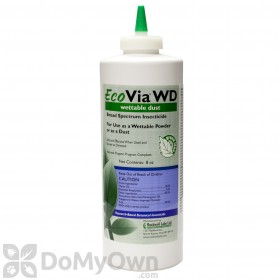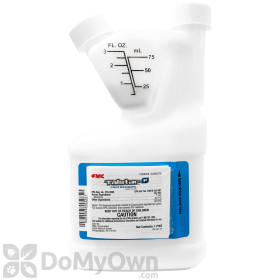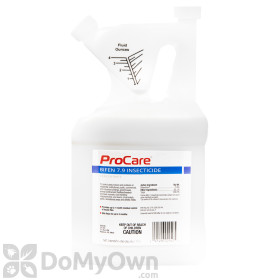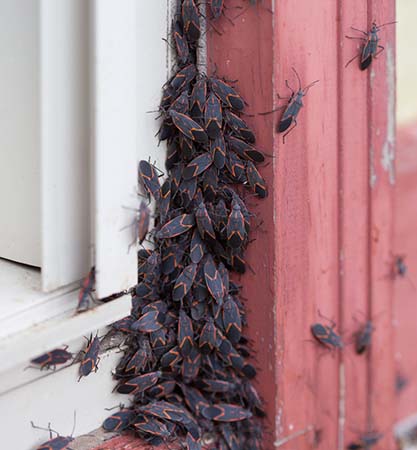
Boxelder bugs are generally harmless pests that will try to enter your home in the winter to survive the cold weather. Once they enter the home, however, they can rapidly multiply and leave a stain behind when disturbed or crushed.
The best way to control a boxelder bug infestation in the home is to prevent boxelder bugs from ever entering the home in the first place. Read this guide to learn how to prevent boxelder bugs and other overwintering pests.
Treat Your Home for Boxelder Bugs
DoMyOwn has created an Overwintering Pest Kit that contains the products needed to prevent a boxelder bug infestation in your home. Read below to learn how to use each part of the kit.
Products needed for Step 1
Treat the Outside of Your Home with Insecticide Spray
Apply a treatment of insecticide labeled for boxelder bugs, such as Talstar P, around the perimeter of your home as temperatures begin to cool but before the first frost of the year. Mix the insecticide with water in a hand pump sprayer according to the product label, then spray around your home in the following areas:
- Spray up to 3 feet up onto the sunniest side of the house or structure. The sunniest side of the structure is where overwintering pests are most likely to congregate.
- 3 feet up from the foundation of the home, around the entire perimeter of the home
- Around eaves and soffits
- Around outdoor light fixtures
- Around door and window frames
- Where caulking around doors and windows has cracked or opened
- Where utility pipes and wires enter the home
Treat the Inside of Your Home with Insecticide Spray
Mix an insecticide labeled for boxelder bugs, such as Talstar P, with water in a hand pump sprayer according to the label. Then, spray the following areas inside the home:
- Beneath sinks
- Under appliances
- Where utility pipes enter the home
- Around door and window frames
- In the corners of rooms
- Where baseboards meet the wall
- In crawlspaces
- In basements
Do not broadcast spray indoors. Wait 1-2 hours until the spray has dried before allowing children and pets to enter treated rooms.
Use Insecticide Dust for Long-Lasting Results
An insecticide dust is another way to protect your home from boxelder bugs and overwintering pests. Insecticides dusts are great for use in hard to reach areas, like behind wall voids and in cracks and crevices. Even better, insecticide dust is long lasting.
To use insecticide dust as part of your boxelder bug prevention treatment, begin by selecting an insecticide dust labeled for boxelder bugs, such as EcoVia WD. Then, using a bellow hand duster, apply insecticide dust to the following areas:
- In wall voids behind outlets
- In the corners of attics and closets
- In cracks and crevices around the home
- Where baseboards meet carpet
- Where cables and pipes enter the home
- Around door and window frames
- Below sinks
- Underneath appliances
- Around soffits
Only apply 1-2 puffs of dust at a time. Too much dust in one spot will be ineffective as the pests will avoid dust in large quantities.
Practice Basic Home and Yard Maintenance
Maintaining your lawn and home is a very basic, but very effective way to prevent boxelder bugs from entering your home. By practicing what is known as integrated pest management, you will increase the effectiveness of your preventative program.
Some general pest prevention best practices include:
- Repairing torn window screens
- Adding door sweeps to external doors
- Cleaning gutters to remove debris
- Adding steel mesh or Xcluder cloth to gaps where utilities enter the home
- Adding caulk to cracks and crevices around the home
- Vacuuming often to remove crumbs
- Keeping your home, especially the kitchen, clean
- Creating a barrier zone by pushing pine straw, mulch, or bark at least 6 inches away from the foundation of the home
For more information on integrated pest management, watch the video below or read our general pest prevention guide.
We hope you have found this guide helpful. If you are not sure if you have box elder bugs in or around your home, read our guide on what boxelder bugs look like to make a positive identification. Where boxelder bugs hide will help you locate box elder bugs in and around your home. And if you do have pests, how to get rid of boxelder bugs will provide treatment information.
If you have any questions about boxelder bugs, other overwintering pests, or any of the products mentioned in this guide, give our expert customer service team a call at 866-581-7378 or email [email protected].
